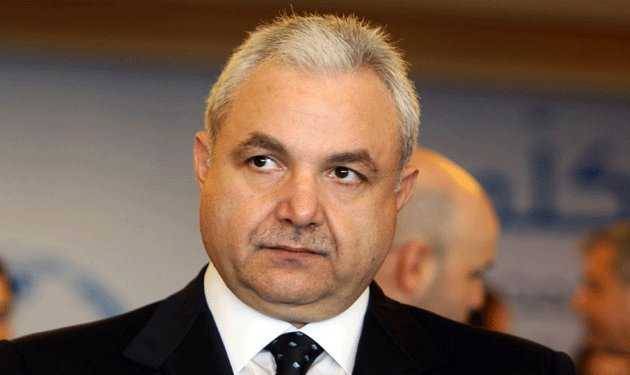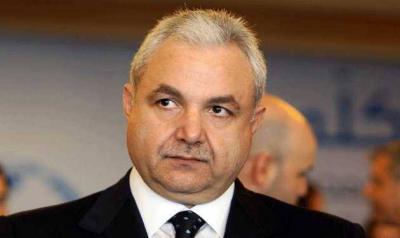The office of Elias Mer, former Deputy Prime Minister and Minister of the Interior and Defense, announced that "after ten years of leading Interpol and successfully executing the strategic plan to support the organization and implementing seven global security programs that benefited 195 countries, President Elias Mer, in agreement with the Secretary-General of Interpol, Mr. Jürgen Stock, has decided that it is time to return to his homeland. President Mer has notified the relevant Swiss authorities of his decision to leave this position before the end of his term in 2028."
The statement noted: "Interpol has published a report highlighting the key initiatives and achievements made during President Mer's tenure in combating terrorism and organized crime, including 195 member countries, such as the following:
- Conducting over 1.82 billion searches in Interpol databases, resulting in 1.3 million positive outcomes.
- Seizing over 140 million illegal goods and counterfeit medications.
- Recovering 2,540,366 lost or stolen travel documents.
- Seizing over 221,000 tons of illegal drugs.
- Conducting 13 million searches and audits within the global initiative against terrorism.
- Managing nearly 110 million records of forensic evidence.
- Organizing around 34,000 virtual meetings using Interpol’s remote solutions, including webinars, training courses, regional meetings, and Global Interpol Alliance events.
- Conducting approximately 600,000 checks, leading to the rescue of victims in cases of human trafficking, smuggling, and online child exploitation. These efforts resulted in the arrest of thousands of criminals.
- Seizing and recovering 135,000 cultural heritage artifacts as part of efforts to protect global cultural heritage.
- Achieving 26,000 positive outcomes in combating vehicle crimes.
- Providing essential equipment to countries in need, including I-24/7 expansions and updating National Central Bureaus (BCN).
These achievements and projects have fortified global security and brought about sustainable changes across the world, enhancing Interpol's mission to prevent and combat cross-border terrorism and organized crime for the benefit of the 195 member countries."
The statement added: "Under President Mer’s tenure, Interpol has implemented seven global security programs, which included:
- The Global Counter-Terrorism Initiative: Interpol developed a five-year global strategy to maximize its policing capabilities. The program aimed to create the necessary infrastructure to help the 195 Interpol member countries effectively tackle cross-border terrorist activities.
- The Drug Trafficking Initiative: Interpol launched the AMEAP program (Africa, the Middle East, Asia, and the Pacific) to assist national authorities in identifying security threats and addressing the organized crime groups involved in illicit drug trafficking in these regions through a transnational operational approach led by Interpol.
- The Cybercrime Information Sharing Platform: Interpol's strategy to combat cybercrime, which targets computer and information systems, aimed to establish a technological platform to enhance Interpol’s ability to acquire, analyze, and disseminate intelligence regarding cybercrime.
- The Fight Against Human Smuggling and Human Trafficking and Online Child Exploitation: Interpol’s program aimed to protect vulnerable communities by identifying and dismantling criminal networks involved in human smuggling, human trafficking, and online sexual exploitation of children, considering initiatives from other regional bodies to coordinate and unify their mutual efforts.
- Cultural Heritage Protection: To enhance the organization’s efforts in protecting cultural heritage, Interpol significantly improved the functionality of its database for stolen artworks (WoA) by making it accessible through a user-friendly mobile application for not only police forces but also accredited public and private entities. The project also provided training courses for National Interpol Bureaus, customs officials, and other users on proper data entry and search procedures, as well as on creating and retrieving statistics.
- Vehicle Crime Reduction: The Interpol Stolen Vehicles (SMV) program aimed to establish Interpol as a leading authority and source in combating cross-border vehicle crime while working in cooperation with existing partners, international organizations, and insurance associations to improve the expertise offered to member countries.
- Preventing the Smuggling of Illicit Goods: The Interpol Illegal Markets project aimed to support member countries in dismantling organized crime networks behind the manufacture, distribution, and sale of illicit goods, including regionally and globally concentrated activities.
Over the past ten years, these results have contributed to sustainable change and have had a long-term impact in all beneficiary countries. Secretary-General of Interpol, Mr. Jürgen Stock, addressed President Elias Mer during the Interpol Foundation Board meeting in Monaco on May 31, saying: 'This is what you have accomplished, Mr. President, and these are the results of the partnership. These achievements, and others, would not have been possible without your sacrifices and support over the past ten years, and in return, you requested nothing for yourself. We are proud to be on the right track, having accepted to assume responsibility with a mandate from the world’s member countries at a time when Interpol was facing very challenging circumstances.'
Stock added: 'With your support, we served 195 countries that benefited from our advanced security programs and contributions, and today Interpol is more capable of providing better service for security and peace because of you. Interpol’s achievements have increased, and countries’ trust in it has grown. On behalf of myself, Interpol, and security leaders in countries that benefited from the security programs, and in the name of the children who were rescued, I thank you, President Elias Mer.'"




